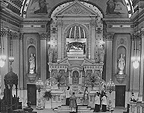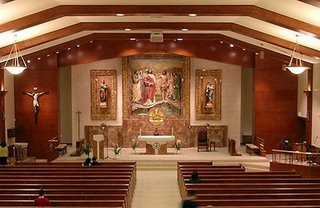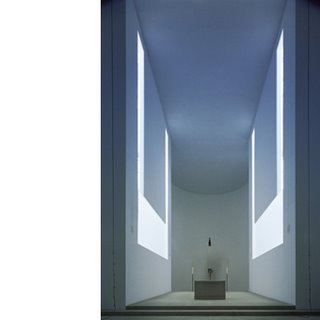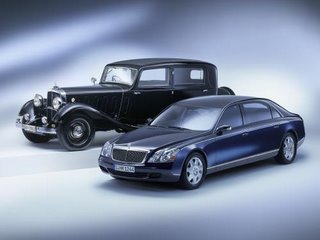JohnL at
TexasBestGrok (found while looking over the sidebar at Bookish Gardener) has an
interesting post about aesthetics in business. His subject is "Ed Bailey, whose ownership of 61 McDonald's locations in the ultra-competitive Dallas dining market has made him one of the most successful restaurant franchisees in the world." Ed's secret was to spend more money on his stores than anyone else, making them aesthetically pleasing.
JohnL then writes:
Mr. Bailey knew then what Virginia Postrel would later identify as the "aesthetic imperative." In Ms. Postrel's words:
Aesthetics--the look and feel of people, places, and things--is increasingly important as a source of value, both economic and cultural....
Aesthetics shows up where function used to be the only thing that mattered, from toilet brushes to business memos to computers and cell phones. And people's expectations keep rising. New tract homes have granite countertops, so hotel rooms have to have granite countertops too. Family restaurants used to be all about price and food, but now they have to worry about their decor. We've gone from Pizza Hut to California Pizza Kitchen. If you're in business, you have to invest in aesthetics simply to keep up with the competition. (emphasis mine)
The Catholic Church - may God bless her abundantly - is far too monolithic to keep up with "trends." That's why, in some parishes, you can still hear 70s flower-child songs at Mass, played by guitars, instead of hip-hop and punk riffs. It's not wrong to let holy inspiration suggest new ideas about ways to celebrate in worship. What's wrong is to deny access the Latin Mass, Gregorian chant, and intricately carved altars, or to convince the laity that they were forbidden, which is essentially the same thing.
We need both. I'm open to both. But I'm convinced that all Catholics have the right to experience their heritage, which includes the beauty and, yes, majesty, of liturgical art and music from prior ages in the Church.
The zeal of wreckovators to purge the Church of architecture of previous ages makes one wonder if their real reason is because what they're putting in its place is ... ?
(tawdry and ineffectual? ... oops - did I say that out loud? shame on me!)Beauty is not the enemy!This Church is ancient. It is the original. We are told that to be old is to be out of date, worthless, not relevant; however, this Church was already ancient - over 100 years old - when Trajan took the Roman Empire to its maximum extent, 300 years before the Western Roman Empire would fall.
The Latin Mass - that arcane ritual which was tossed aside so casually 40 years ago - fed the spirituality of millions people for almost 2,000 years. If it was so inimical to faith, how
did the Church manage to toddle along without the fresh ideas of those who didn't read (or dismissed as "not going far enough") the documents of the Council??
|| Memorandum ||
From: God
To: All who think the Catholic Church needs lots and lots
of busy tinkering with architecture, literature, philosophy, theology, et al.
_______________________________
Cool your jets.
YHWH:
(various secretaries in His employ)* * *
Two weeks ago I had the privilege of attending the
Concours d'Elegance at Pebble Beach. This is considered the premiere event of its type in the United States.
You could say that it's all about old cars, and you'd be right. You hear people say lots of stuff about old cars. Like,
old cars - who wants 'em? They don't have air conditioning. They aren't sensitive to the car seekers of today. The youth aren't interested. Young people would never show up to see old cars.Oh yeah?
 (image found here)
(image found here)How about an old car of such beauty and intrinsic worth that it has been restored from the ground up to its original beauty ... and even runs?
 (image from Madle)
(image from Madle)Yes, those are old cars. No, not everyone would want one at home. They are expensive to keep, etc. But, for car enthusiasts, they are the basics - like learning art history for an artist, or singing
bel canto for a future opera star, or learning about
roux for a future chef. To see these beautiful autos restored to their former glory - absolutely authentic, right down to the tires, which are specially made - is inspiring.
Those automobiles were built for fashion, of course; but they remain as icons because to experience them is to capture some of what it was to explore the possibilities of automotive transport. The art of their construction re-breathes ideas from prior years, while looking forward to the next. It is one thing to look at an image. It's another to see the sheer bulk of them, the gleam of chrome, the upholstery and appointments, and to hear the engine run. It is to understand what people felt when they bought and used cars in those days. It hearkens back to the history of motoring. Without those carefully-preserved automobiles, we would not have access to the experience.
Not much of a leap to think about how that applies to church architecture.

To experience one of the incredibly beautiful cathedrals in France, say, is to have a clue as to the devotion, faith, tenacity, and priorities of the people who had them built, and the pride they took in their work.

To alter a church on the theory that The Spirit of Vatican Two requires it is to try to seize the elusive winds of fashion.
Why adopt deconstructionism in church art...

(St. Vibiana's altar in 1945, left; Our Lady of the Angels altar at its consecration, right.)
...just as a renewed appreciation for the finer things in life is reviving worldwide?
 (St. John the Baptist, Costa Mesa; the stunning result of a renovation completed just this year [h/t Gerald; a commenter on the post wrote, "Wow! It's like someone at that parish suddenly woke up and said, 'Gee, we're not Protestants. Howz about we restore some grandeur and the promise of Mystery?'"] Gerald has been running a series of incredibly beautiful photographs of churches, by the way; do check them out.)
(St. John the Baptist, Costa Mesa; the stunning result of a renovation completed just this year [h/t Gerald; a commenter on the post wrote, "Wow! It's like someone at that parish suddenly woke up and said, 'Gee, we're not Protestants. Howz about we restore some grandeur and the promise of Mystery?'"] Gerald has been running a series of incredibly beautiful photographs of churches, by the way; do check them out.) Simplicity can be beautiful, and inspiring:
 (image from John Pawson Architecture, of the Novy Dvur Cistercian Monastery, Abbaye Notre-Dame de Sept-Fons; Czech Republic 2004.)
(image from John Pawson Architecture, of the Novy Dvur Cistercian Monastery, Abbaye Notre-Dame de Sept-Fons; Czech Republic 2004.)The austerity which arrests and focuses the attention can still overflow with beauty.
The Roman Catholic Church is known for her mysticism and her abundant and enduring contributions to the art of the Western world. We need to trust the generations before us which preserved timeless design principles, and let their contributions stand until we can understand them more clearly. To have new does not always mean the old must be destroyed. Truly brilliant design doesn't require that the old be destroyed to allow the new; nor does it compromise one for the other. Instead, it allows the two to mutually complement, support, and inform.
 (Maybach image source)
(Maybach image source)









